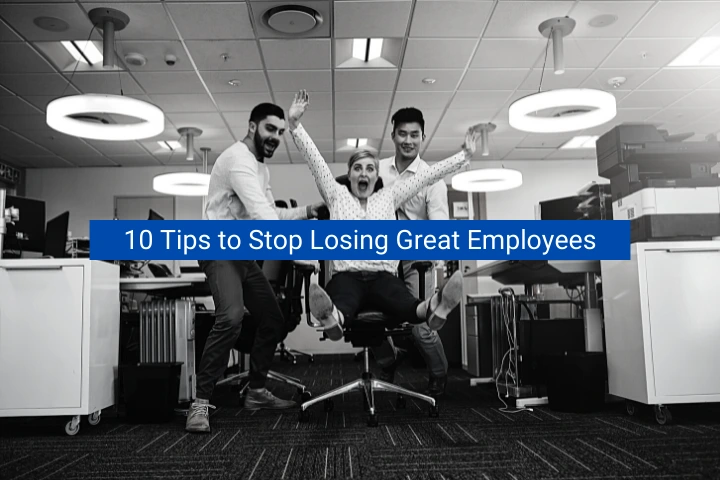How do we keep our superstar employees in a job market that is booming? It's an age-old question, and I've included some tried-and-true advice and secrets from great leaders below. How do we ensure we get a return on our investment after spending time and effort training personnel and watching them develop into top performers? Employees who take their gained skills to competitors or elsewhere, in general, are a sad loss. We'll give you some tips to stop losing your great employees and retaining top employees entails more than just paying them well.

We've learned to value certain retention and engagement techniques over the years as an HR leader, Leadership Instructor, and Facilitator, and We are happy to share the top 10 tips to stop great employees with you. Making others stronger and better is a part of leadership. We've had the good fortune of having mentors who have kindly shared their best practices with me. The best leaders, in our experience, are the ones who are most willing to share their knowledge.
Related: 7 Common Mistakes That Good Leadership Don’t Make
1. Demonstrate genuine concern and care:
Because we spend so much time at work with our coworkers, managers, and leaders who can connect with their teams are more likely to win hearts and minds.
2. Appreciate and Recognize Contributions:
When their effort merits great praise, everyone wants to be appreciated and recognized. When new employees join your company, ask them if they prefer to be acknowledged. This way, you may personalize your appreciation displays. The fact that you took the effort to learn about their unique tastes demonstrates that you care.
3. Develop and promote development strategies:
Assist your team in establishing broad and specific goals in order to identify areas where they may improve. Day-to-day feedback, performance evaluations, and/or leadership assessments can all help with this. Set both broad and detailed objectives. As a leader, you have the power to positively influence your team members. Take advantage of opportunities to coach employees to be thoughtful and self-sufficient without micromanaging.
Related: How Do You Deal With Bad Workforce Culture?
4. Develop Emotional Intelligence and People Skills:
It's critical to hone your interpersonal skills and emotional intelligence. Request input from individuals you trust and push yourself to be aware of your strengths and opportunities for improvement. Emotional Intelligence is the subject of numerous books. It also includes an assessment so you may judge your own progress. You receive a second opportunity at the evaluation after reading the book to see how far you've progressed. You are more likely to engage and connect with your team members if you have great people skills.
5. Use delegation to stretch and challenge yourself:
Delegation is a management strategy that may be utilized to improve efficiency, as well as a leadership tool that can aid in the development of your team members. Choose assignments depending on the level of experience of the team member who will complete the task, and allow more autonomy to more knowledgeable employees and employees with the required skills.
6. Check-Ins on a Regular Basis:
The current trend is for frequent check-ins to replace troublesome one-time annual evaluations. I think that it is critical to check in with your team members on a frequent basis. It's worth noting that I use the term "Check-In." This is not the same as "checking in on." Check-ins can be effective if they are used to provide and receive constructive feedback.
7. Commemorate Life Occasions:
Individual team member life events, such as marriage, childbirth, work anniversaries, and birthdays, demonstrate to your team that you care about them as people, not just what they can perform for you. While I support boundaries, I believe that displaying your human side is beneficial and that if you try it, you will likely receive positive feedback.
Related: Internal and External Business Challenges
8. Encourage collaboration:
When you're part of a well-functioning team, going to work is a pleasure. Patrick Lencioni's book "The Five Dysfunctions of a Team" is the best book about teamwork. The author discusses the significance of trust, productive disagreement, commitment to the team and goals, the existence of accountability, and, finally, a team that strives for success in his tale about a dysfunctional team.
9. Make employees aware of the big picture:
Employees must understand how their job affects the company's goals in order to be fully engaged. Every position has value, and employees should be aware of how their contributions help the organization achieve its goals.
10. Pay-For-Performance Must Be Meaningful:
Compensation was kept for last because it has been found to have little impact on employee motivation and performance. However, if employees believe their compensation is unjust, it is likely to demotivate and disengage them. High-achievers want to know that their efforts are being recognized and appreciated.
For Human Resource, Payroll and many more HR Services, visit our website https://lingueeglobal.com/



